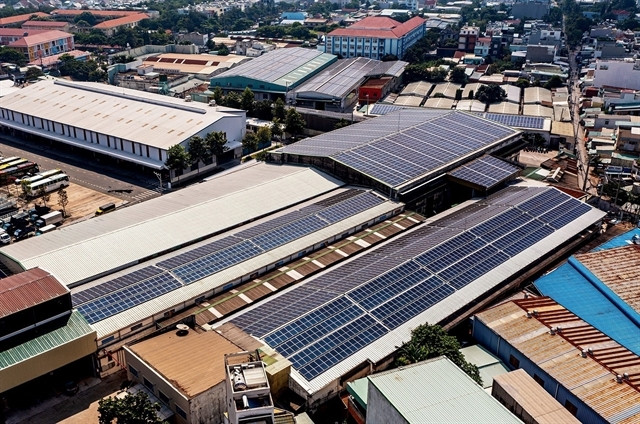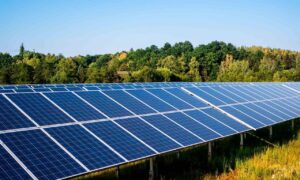According to the plan, Vietnam Electricity will pay for the surplus energy from the local solar power system to the national grid in alignment with the average market electricity price of the previous year.
Deputy Prime Minister Trần Hồng Hà on Tuesday chaired a meeting on a draft decree to encourage rooftop solar power, highlighting simplified processes for effective development.

Solar panels installed on a roof of a factory block in HCM City. —VNA/VNS Photo Hồng Đạt
Addressing the meeting, he emphasised logical, comprehensive, scientific and economic approaches in drafting the document, which will be considered as part of the national Power Development Plan 8 (PDP8) to ensure energy security and respond to socio-economic development demands.
The Ministry of Industry and Trade (MoIT) is directed to work on certification for self-sufficient solar power development at residential and office buildings, ensuring that this process is: “As simple as possible, without creating new administrative hurdles.”
“Rooftop solar power in the northern region still has much room for growth, therefore, policies are necessary to encourage effective investment and development,” said the deputy PM.
The MoIT will review the load demand and transmission capacity to adjust the plans and facilitate rooftop solar power growth.
According to the MoIT’s proposal, a residential solar power system in the north can sell its excess electricity to the national grid – 20 per cent of its actual installed capacity at maximum. This figure is 10 per cent for the remaining regions of the country.
The Vietnam Electricity (EVN) will pay for the surplus energy contributed to the national grid at a price that is less than or equal to the average market electricity price of the previous year. This is expected to ensure appropriate incentives during different growth stages of the national grid.
Deputy PM Hà noted that technical management measures are necessary to monitor the capacity of self-sufficient solar power systems connected to the national power grid, especially the medium-voltage grid systems, to ensure safety.
He delegated the MoIT, the EVN and relevant departments to work on this matter and submit a report to the PM for necessary adjustments to the national power development plans.

Deputy Prime Minister Trần Hồng Hà chairs the meeting on Tuesday. — VNA/VNS Photo Văn Điệp
According to the MoIT’s report presented at the meeting, after taking into consideration comments from other ministries, businesses and experts, the MoIT has adjusted and amended policies to encourage self-sufficient rooftop solar power.
Home-based solar electricity systems that are not connected to the national grid are prioritised, allowing unlimited capacity and exemption from having to obtain an electricity operating licence.
In the case where a residential rooftop solar power system’s capacity is over 1MW and its owner chooses to sell the surplus energy to the national grid, they will have to complete the application procedures for an electricity operating licence as per the laws.
To simplify registration processes for self-sufficient rooftop solar power systems, provincial-level People’s Committees will be responsible for drafting and issuing streamlined procedures for organisations and individuals to register their rooftop solar power systems.
The committees will also delegate management authority to guide the solar power system owners in this process, ensuring law compliance as well as them meeting environmental, electrical and fire safety requirements.
According to EVN general director Nguyễn Anh Tuấn, the northern region’s power grid currently counts about 700MW of rooftop solar power, while the system’s capacity can accommodate around 7,000MW.
Đỗ Văn Năm, an executive board member of EVN’s Northern Power Corporation believes that if this decree is approved, people will not only save money on their electricity bills but also recover their investment into their rooftop solar power system after just five or six years. The average lifespan of a solar panel is currently between 12-15 years. — VNS
Source: vneconomy







